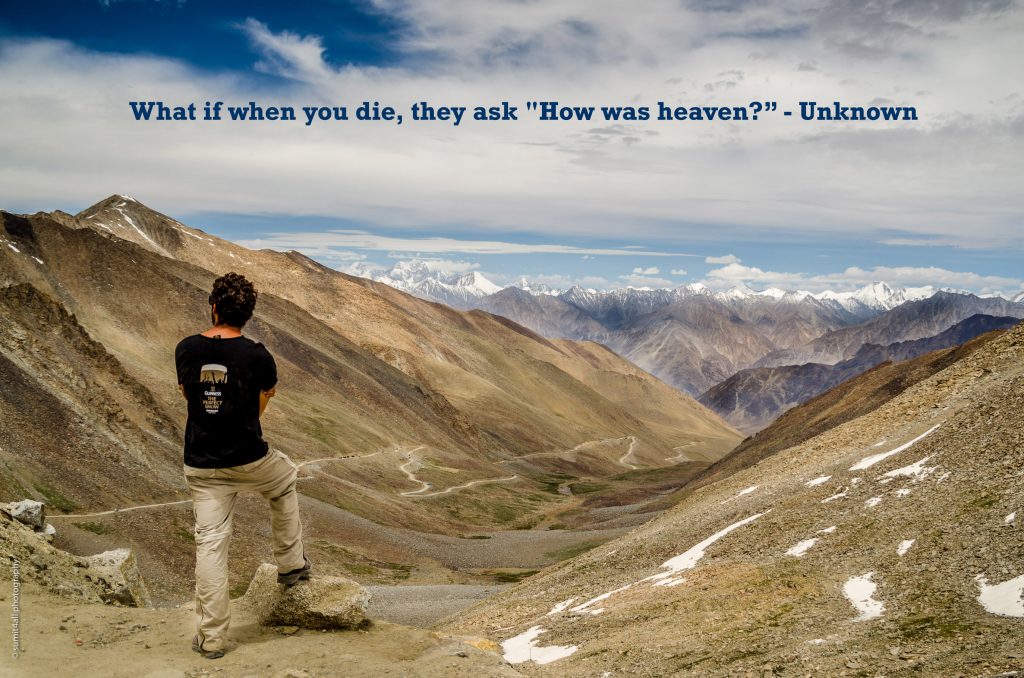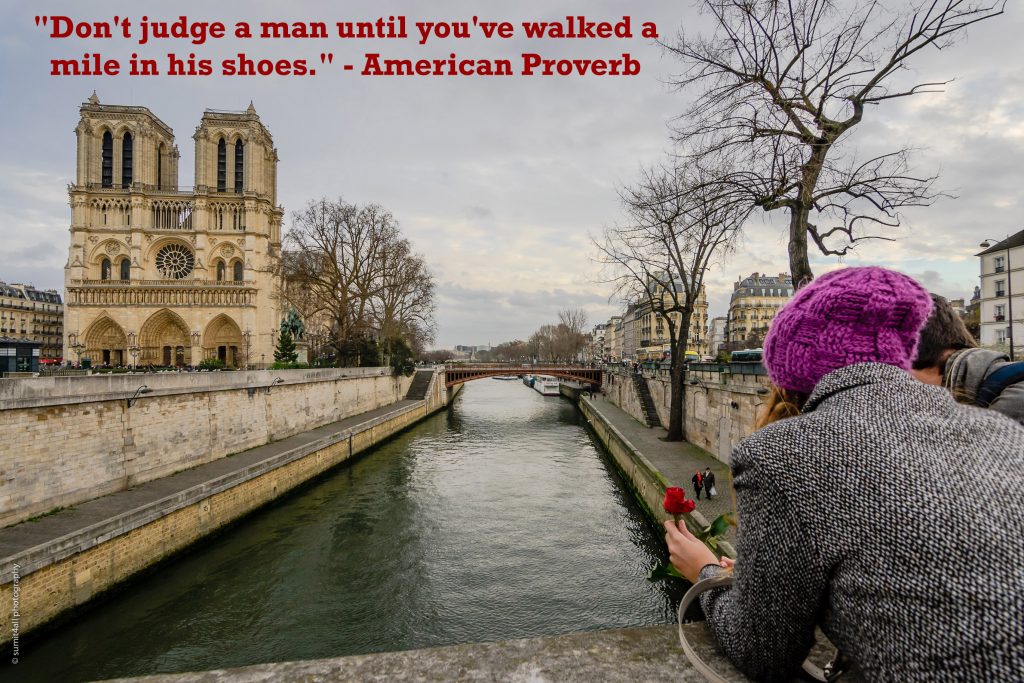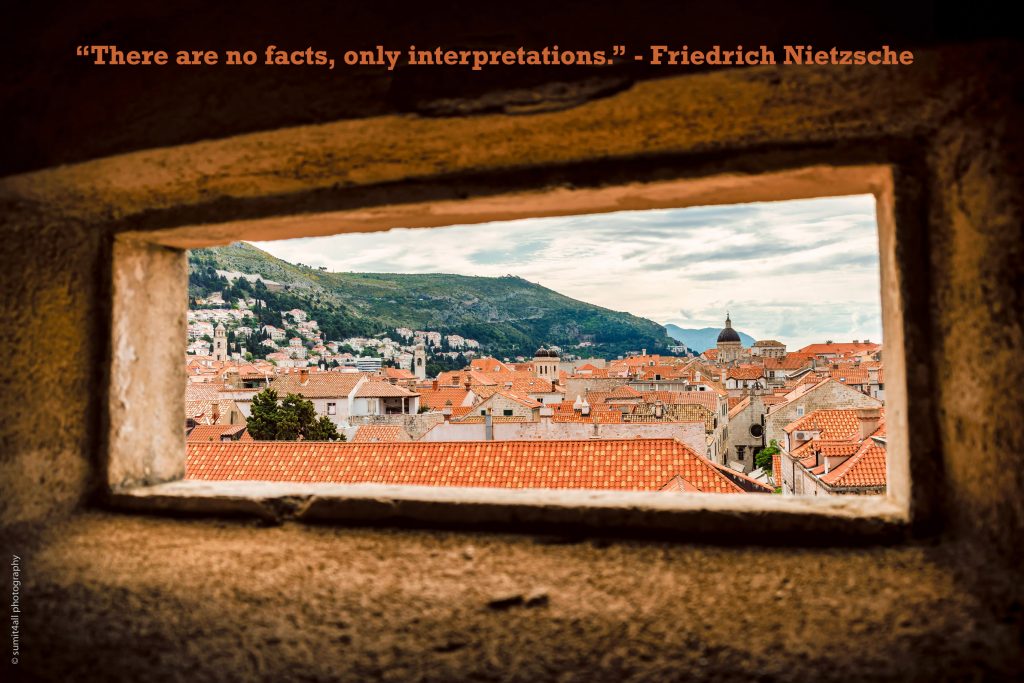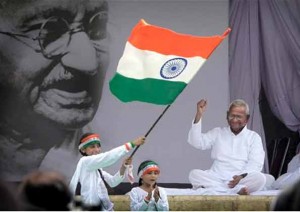Tom : “I am sorry I am a bit late to this meeting. My previous meeting ran over.”
Sara : “I am more worried about the missed deadline on the product your team is developing. Your team is slow.”
Tom : “It’s not my fault. Two members on my team reported sick last week and I can’t help it.”
Sara : “I don’t really care what happened. But I know I can’t count on your team. This makes me look bad.”
Tom : “You are not being fair, Sara. “
Sara (to herself) : “Tom’s lack of experience shows. He doesn’t hold his team accountable, and always has excuses for delays.”
How many times have we spoken or seen others speak such sentences? As we solve complex business problems, very often we “know” the truth (you are slow, this is not how things work here, etc) and base our actions on it. In this article I want to stress that there are no truths in the workplace (and life). There are only perspectives, and there can be many different perspectives depending on how you look at the situation. Once we realise that our apparent “truth” is only a perspective, it allows us to view the same situation differently to help us make better decisions.
How We Form Our Truth?
The first thing we must do is to take a pause and ponder about how we form our truth in the first place. We (human beings) gather inputs from our five senses – smell, touch, sight, sound and taste. Anything which is external reaches us via one of the senses. We touch something which is hot, and we “know” it is dangerous and not safe. We hear something from multiple people or from a reliable source, and are inclined to believe it as “truth”.
The quality, source and frequency of sensory information we gather has a big role in how we interpret it. For example – If you read an article with a lot of grammatical and spelling mistakes (quality), you are less likely to trust the content. Similarly, if you hear about the same thing from multiple people (frequency), you will be more inclined to trust it.
Once we collect the sensory information from the outside world, our brain make sense of it. It decides which signals to pay more attention to and which to ignore. Our brains also apply the collective influence of our memories, beliefs, thoughts and values to every new information, and derive meaning from it. I already wrote about Listening Filters and how they create the “truth“. For example – Growing up in a very hierarchical corporate culture (and society) in India, it still takes effort on my part to see and interact with people above me on the corporate ladder as peers in Amsterdam.
The Five Different Perspectives
The important thing to realise here is that the “truth” we form by the above process is only “our” truth, and not the absolute truth. Realising that different people can see and create their own truth in the same situation is the key to working together more productively. Seeing our own truth as a ‘perspective‘ instead of the truth leads to humility and a willingness to consider other perspectives.
Unless we step down from the high pedestal of truth we often end up placing ourselves on, we can’t see all the other perspectives out there. I believe there are (at-least) five different perspectives which can offer tremendous insights to us. However, it is not always easy, nor are we often willing, to view a situation from these perspectives. They might lead to some uncomfortable moments, but the process can often result in new insights and learnings. These not only can lead to better results but also help us become more human in the process.
As I write down the different perspectives below, I will also specify a few questions we can ask to uncover each perspective :-
First Person (My) Perspective
The first person perspective is how I see and perceive things. The biggest clue about the first person perspective is the usage of pronouns like We, Us, Our, I, Me, Mine in our thoughts and language. This is the most natural perspective for all living creatures, and we listen and think in first person perspective by default. The first person perspective leaves you with ownership, authenticity and often attachment to your point of view.
Questions to Uncover First Person Perspective
1. What conclusion am I arriving at?
2. Is it the truth, or just my opinion?
3. What reasons/proof do I have for my opinion?
For Example – Sara’s (in the above conversation) first person perspective could be – “Tom is a difficult person to deal with because of his immaturity. I can’t trust him or his team as he is not accountable.”
Second Person (Your) Perspective
The second person perspective is seeing things from another person’s point of view. Listening to someone and making efforts to understand her perspective shows respect. The second person perspective calls for seeing and feeling the world as another person does. It doesn’t matter if you agree or disagree with it. The second person perspective has a lot to do with listening and it can have a massive impact. Second person perspective leaves you with empathy and humility.
Questions to Uncover Second Person Perspective
1. How would this situation look and feel to him/her?
2. How would he/she interpret the situation? Can I step in his/her shoes?
3. Can I feel how he/she might be feeling (anger/joy/frustration) right now?
For Example – Sara’s second person perspective could be – “Tom is new to this job and he must be finding it difficult to make demands from his people. He must be really stressed out and might need some help to manage his priorities better. I might only be making matters worse for him. Instead, can I help him somehow?”
Third Person (His/Her) Perspective
Another perspective could of a related third party. If you are talking to your colleague, a third party perspective could be of your manager or another colleague. For example – In a workplace, a third person perspective could be of a colleague whose work will/might be impacted by what you are talking about. Seeing through the third person perspective leaves you with a big picture view, more options and opens up blind spots.
Questions to Uncover Third Person Perspective
1. How would my boss think about this situation?
2. How would the sales head think about this conversation?
3. If I were him/her, how would I have described the situation?
For Example – Sara’s third person perspective, from the point of view of another colleague, would be – “Tom is trying hard to keep everyone happy, and failing at it. And Sara is not making it any easier for him by making demands without understanding his situation. How will they make this project succeed? If they fail, it will hurt our team and we will miss our targets.”
Stranger (Witness) Perspective
The fourth perspective calls for viewing the situation from the point of view of a witness. A witness is someone who neither has any stake in what you are discussing nor does he knows either of you. The witness perspective is purely objective, and the witness observes the proceedings just like a camera would. Taking this perspective leaves you with detachment and objectivity. You see things as they are, without any judgement and attachment to either side or to a specific outcome.
Questions to Uncover Stranger Perspective
1. How would a stranger see and report my situation?
2. If this were a movie, how would I describe it?
For Example – Sara’s stranger perspective could be – “Tom is acting like a typical newbie, and is going to make the same mistakes everyone makes. People around him are too busy in their own lives to help or assist him grow through this phase in his career. Sara or Tom’s manager can step in to help, but do they even realise the need for it.”
God / Compassion Perspective
The fifth perspective calls for looking at the situation from a place of love, kindness and compassion. With this perspective, we look how we can make things better for every party involved, and worse for no-one. We attempt to listen to our inner voice (consciousness) in this perspective. How does it feel? Is there something which I know but am unwilling to acknowledge?
Questions to Uncover God Perspective
1. Would I want this conversation to be aired on TV, or reported in tomorrows’ newspapers?
2. Do I hear an inner voice saying “this doesn’t feel right” or anything else?
3. How would Jesus / Allah / Buddha / Krishna do in my situation?
Disclaimer – This perspective has nothing to do with religion or our religious views, but is rather an invitation to stand in a place where we want to see everyone happy. It is about feeling instead of thinking, and using our heart for mutual well-being instead of our brain for personal gains and business results.
For Example – Sara’s fifth perspective could be “Tom must be going through a hard time, and might even be carrying his stress into his personal life. And I am not making it any easier for him. Can I help him manage his priorities better? Can he seek some training or help? The same holds true for me too. Going after business goals are fine, but it doesn’t have to be at the cost of stress and unhappiness.”
To conclude, asking the above questions and viewing our situation from multiple perspectives can be tremendously liberating. It can provide us with options which weren’t visible to us before. Getting lost in what we believe to be the truth (first person perspective) can bring us stressful days, broken relationships and health problems.
All of this can often be avoided by taking a look at the above five perspectives. It can often ease up any emotional build up (stress, anger, over-excitement) and prevent us from doing something in haste and from our limited viewpoint. It might not solve every business problem we get stuck in, but we can surely finish with better results and make more informed choices after considering these five different perspectives.





